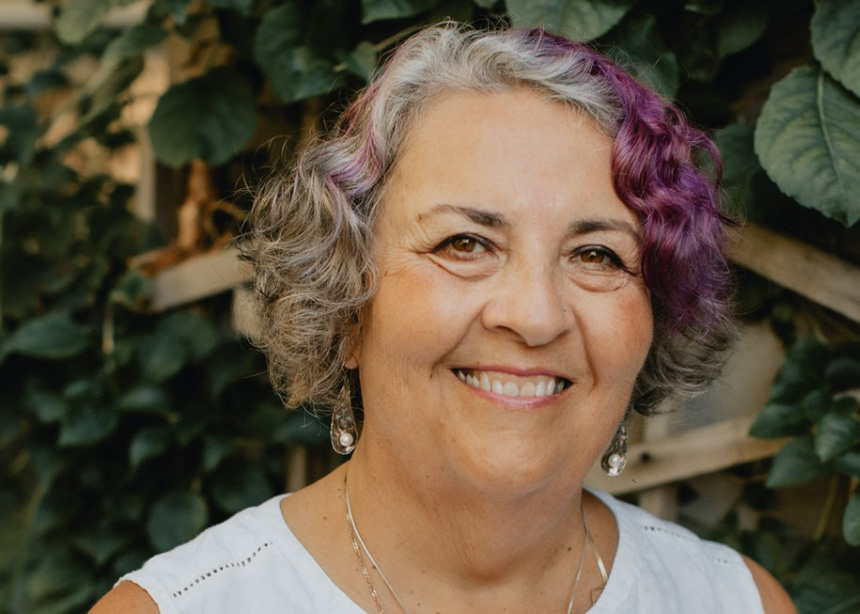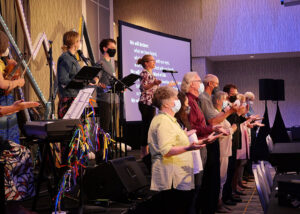Geraldine Balzer, a member of Nutana Park Mennonite Church in Saskatoon, was elected moderator of Mennonite Church Canada in July, replacing Calvin Quan, who served in the role for six years. We asked her to share about her life and vision. This interview has been edited for length and clarity.
Emily Summach: Where did you grow up?
Geraldine Balzer: On a farm outside Mayfair, Sask.
ES: What do you remember about growing up?
GB: I was a farm kid, so I remember lots of independent outdoor time. I also spent lots of time with books; I was a reader. I remember being annoyed when the work of gardening or farm tasks took time away from reading. I was sort of a nerd in a community where “nerding” wasn’t welcome.
I also have fond memories of the church—one of those spaces that was always there, always felt part of my life.
ES: What authors have influenced you most?
GB: Barbara Kingsolver. Ann Pachett. Recently, I’ve been reading Fredrik Backman. I like books that challenge me to rethink the way I see the world, books that are hard.
ES: Which musicians or other artists have influenced you?
GB: I grew up in the era of folk music, so I’m very attached to that ’70s folk-music genre. Carly Simon, Bob Dylan, Bruce Cockburn. I also like female indie artists, and Canadian artists. Songs that tell stories, sometimes fun, sometimes about hard things, songs about social change and social justice.
ES: Is there a Bible verse that is particularly on your mind these days?
GB: Micah 6:8: “. . . do justice, love mercy, walk humbly . . . .” If I ever was going to get a tattoo of a Bible verse, I would get that. It encapsulates the way I want to live in the world.
ES: Do you have children? Grandchildren?
GB: Two daughters. Two granddaughters.
ES: Pets?
GB: I have a standard poodle, Zephyr. Zephyr means “west wind,” so it felt appropriate for a prairie animal.
ES: Hobbies?
GB: Quilting. Needlework. I like walking, especially with my dog. Cooking.
ES: Anything else you think readers might be interested in knowing about you?
GB: I spent 14 years living in Canada’s Arctic, in small Inuit communities. Those 14 years shaped my understanding of Indigenous issues, my role as an instrument of colonialism, and my sense of the church.
I worshipped in an Anglican church because that’s what was there. We worshipped in English and Inuinnaqtun. I worshipped with people who were understanding Christianity from a very different place than I had.
Those 14 years significantly shaped the work that I do now and, I hope, shaped the way I think about MC Canada and the way the church is situated in the world.
ES: What excites you about the church?
GB: I think we are coming through a really hard time. I think that hard times can make the future more exciting. COVID-19 interrupted life for everybody, which really gives us an opportunity to think about what church is like, going to be like, and what we hold as important. That’s exciting to me—thinking about what may be.
[I’m] excited about the way MC Canada is looking at the intercultural church, who the church body is, and the standard notion of who Mennonites are.
We’re grappling with social issues in different ways, too. Instead of only bringing our hands to the poor, we’re doing the mind work of asking, “Why are they poor? Why are they marginalized? How do we understand the place of Indigenous people in Canada and the world? How has what we’ve been taught perpetuated colonialism?” These are big questions to ask ourselves as a church. I doubt there will be clear answers, but the questions are important.
ES: What do you see as the primary challenges facing MC Canada?
GB: Growing leadership, as we see shifting dynamics in our churches and leaders. Where are our emerging leaders going to come from? What will that new leadership look like? Is it going to look like the structures we’ve had, or different? It’s not as easy as it once was to find pastoral leadership, so how do we nurture leadership?
I think we will continue to grapple with the world of witness and the history of colonialism. How can we be witnesses without perpetuating colonialism or other harms?
Also, how we work with Mennonite churches globally.
Finance is always tied into everything, so how to build a vision that people see and want to invest in. The Indigenous and settler relations piece too. . . . A lot has been done by way of exploring and understanding how we’ve been complicit in so many harms. Now, I think the question is how do we work on healing those relationships?
Climate change, too, which is both a national and global issue. So many questions that impact our daily lives in so many ways. Questions that are not theological, but also deeply theological.
Do you have a story idea about Mennonites in Saskatchewan? Sent it to Emily Summach at sk@canadianmennonite.org.









Leave a Reply
You must be logged in to post a comment.